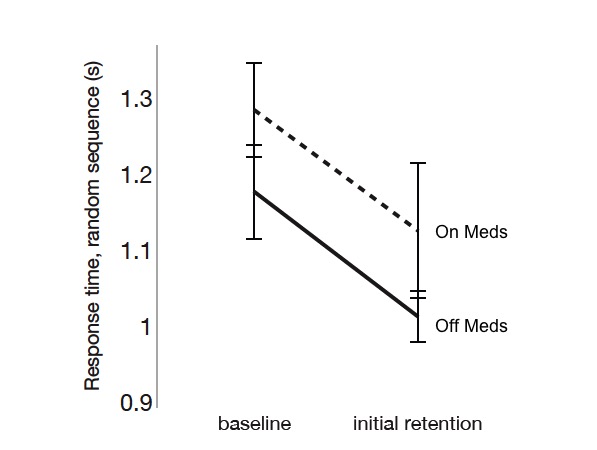Session Information
Date: Wednesday, June 7, 2017
Session Title: Parkinson's Disease: Cognition
Session Time: 1:15pm-2:45pm
Location: Exhibit Hall C
Objective: To determine if i) dopamine replacement affects general and sequence specific learning of a postural task in people with Parkinson disease (PD), and ii) training “on” levodopa medication affects transfer of movement skill to untrained postural tasks compared to training “off” medication.
Background: Background: Impaired motor learning in PD may be due to dopamine deficiency or to overdosing of the basal ganglia with dopamine replacement therapy. Previous research has suggested that exogenous dopamine suppresses activation of the associative striatum during the early acquisition stages of motor learning.[1] However, the clinical relevance of these findings have not been tested on environmentally valid tasks.
Methods: 19 participants with PD were randomised to train on (n=10) or off (n=9) levodopa medication. Participants practiced multiple blocks of stepping task trials over three consecutive days (acquisition period), followed by an initial retention and delayed retention test (2 and 9 days after training, respectively). Each trial consisted of a sequence of 12 random and 12 repeated step sequences presented in a random order across trials. Transfer was assessed using the four square step test and MiniBEST test “on” levodopa before acquisition and at delayed retention.
Results: There were no between group differences in general (p=.28) or sequence specific (p=.06) learning of the postural task, controlling for baseline performance. However, both groups demonstrated improved performance in the stepping task over the acquisition period (p=.03). There was no difference between groups in performance carryover between end of acquisition to either retention session (p=.12–.52) or in transfer to performance of untrained postural tasks (p=.46–.71). [Figure 1]
Conclusions: Dopamine replacement did not differentially affect general or sequence specific learning of a postural task in people with PD. There was a trend for people who trained “on” medication to improve sequence specific learning. Successful learning of postural tasks that challenge stability may improve gait and balance and reduce falls in people with PD. More research is required to determine the practice dose required to improve postural stability in people with PD.
References:
- Vaillancourt et al. Dopamine overdose hypothesis: evidence and clinical implications. Mov Disord. 2013;28:1920-9.
To cite this abstract in AMA style:
S. Paul, G. Olivier, C. Walter, S. Schaefer, L. Dibble. Dopamine replacement influences on postural motor learning in Parkinson disease [abstract]. Mov Disord. 2017; 32 (suppl 2). https://www.mdsabstracts.org/abstract/dopamine-replacement-influences-on-postural-motor-learning-in-parkinson-disease/. Accessed January 4, 2026.« Back to 2017 International Congress
MDS Abstracts - https://www.mdsabstracts.org/abstract/dopamine-replacement-influences-on-postural-motor-learning-in-parkinson-disease/

